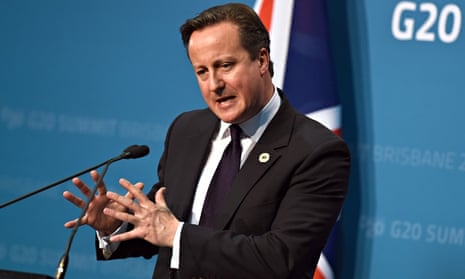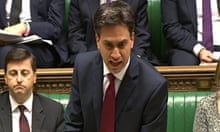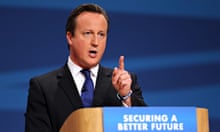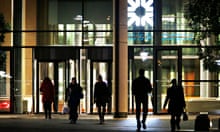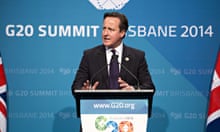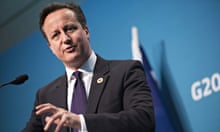Six years on from the financial crash that brought the world to its knees, red warning lights are once again flashing on the dashboard of the global economy.
As I met world leaders at the G20 in Brisbane, the problems were plain to see. The eurozone is teetering on the brink of a possible third recession, with high unemployment, falling growth and the real risk of falling prices too. Emerging markets, which were the driver of growth in the early stages of the recovery, are now slowing down. Despite the progress in Bali, global trade talks have stalled while the epidemic of Ebola, conflict in the Middle East and Russia’s illegal actions in Ukraine are all adding a dangerous backdrop of instability and uncertainty.
The British economy, by contrast, is growing. After the difficult decisions of recent years we are the fastest growing in the G7, with record numbers of new businesses, the largest ever annual fall in unemployment, and employment up 1.75 million in four years: more than in the rest of the EU put together. But the reality is, in our interconnected world, wider problems in the global economy pose a real risk to our recovery at home. We are already seeing that, with the impact of the eurozone slowdown on our manufacturing and our exports.
We cannot insulate ourselves completely, but we must do all we can to protect ourselves from a global downturn. Working through the agenda at the G20, it was clearer than ever how vital it is that we stick to our long-term plan at home and at the same time play our part in the international response to the global challenges on which our economic security also depends.
When we faced similar problems in recent years, too many politicians offered easy answers, thinking we could spend, borrow and tax our way to prosperity. Those were the wrong answers then; they are the wrong answers now. We are not going to repeat the mistakes of the past. Nor will be successful by listening to those who suggest we can hide away from the world.
As the global economy faces greater uncertainty, it is more important than ever that we send a clear message to the world that Britain is not going to waver on dealing with its debts. This stability is vital in attracting the business and international investment that delivers growth and jobs, and which keeps long-term interest rates low. So we will stick to our plan on the deficit and continue to use monetary policy to support growth without adding to borrowing or debt. The G20’s Brisbane Action Plan reaffirmed the critical importance of this approach.
At the same time, we need to carry on with our plan to rebalance our economy so that we see an economic and industrial renaissance in every part of our country. Our long-term plan is backing business by scrapping red tape, cutting taxes, building world-class skills and supporting exports to emerging markets. Underpinning all of this is our radical programme of investment in infrastructure. Again this was a central theme at the G20 and Britain is proudly leading the way. We are making the biggest investment in roads since the 1970s and the biggest in rail since Victorian times, connecting 40,000 premises to superfast broadband every week, and starting an energy revolution with the first new nuclear plant in a generation, the world’s first green investment bank and the largest production of offshore wind on the planet. This continued investment and support for business is vital in creating jobs and enabling Britain to compete successfully in the global race.
But protecting our economy also means forging international action to meet the big global challenges that threaten our recovery at home. At the G20 it was clear that the biggest of these are the threat of protectionism, the damaging effects of corruption and global tax avoidance, and the instability caused by conflict and disease.
Britain is playing a leading role on each. At this G20 I brought together a crucial meeting between President Obama and fellow European leaders to insist on urgent progress on a comprehensive EU-US trade deal that could add £10bn to the UK economy alone. The new European commission must put this at the top of its to-do list. At a time when the Eurozone is stalling we cannot duck such an opportunity for growth. We should sign more deals with Australia, and with China and India too. We need to persuade more countries of the benefits of free trade and open markets for all our peoples and for the wider world. We are also pressing for reform of the World Trade Organisation so that poverty busting trade deals are put together, agreed and implemented more quickly.
We must also make sure that big businesses pay their fair share of taxes. Ensuring these taxes are paid is vital in sustaining the low taxes at the heart of our plan, enabling hardworking families and businesses to keep more of the money they earn. We reached a G20-level agreement to ensure that there is nowhere for large companies to hide to avoid paying the taxes that are due. The G8 meeting I chaired in Northern Ireland also forged a ground-breaking initiative to stop the true owners of companies hiding behind a veil of secrecy, tackling the cancer of corruption that does so much to destroy countries and increase the risk to our own security. In Brisbane we also reached agreement to extend this work to cover the whole G20.Finally, whether it is standing up to Russia’s illegal actions in Ukraine, dealing directly with the threat of terrorism from extremists or leading global action against Ebola, the steps we take to ensure our national security will support our economic prosperity too.
For example, at the G20 I forged a specific leaders’ statement on Ebola urging other countries to contribute to the international effort and support the development of safe, effective and affordable vaccines and treatments. Under my leadership Britain will always step up and play its part on the big development and security threats we face. Not just because it is morally right, but also because it is the best way of protecting our people and dealing with the instability that threatens our long-term prosperity.
In six months’ time, Britain will face a choice: the long-term plan that has seen it prosper, or the easy answers that would surely have seen it fail. By sticking to our long-term plan at home and standing up for Britain’s interests abroad, we will do everything possible to protect our economy and give hardworking families a secure future in a Britain they are proud to call home.
